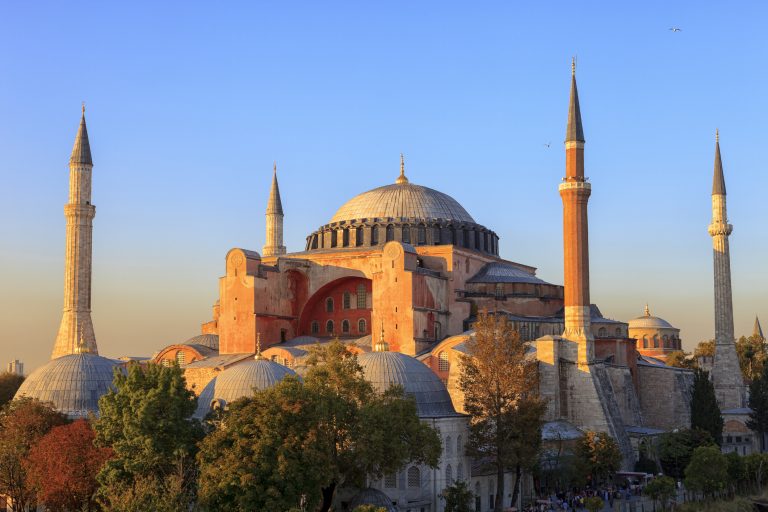
Rev Dr Chris Ferguson, General Secretary of World Communion of Reformed Churches, wrote to His Excellency Recep Tayyip Erdogan President of the Republic of Turkey on 21 July , 2020 concerning the change of the Status of the Hagia Sophia:
Mr. President,
On 10 July 2020, the Turkish Council of State had decreed that the Hagia Sophia can only be used as a mosque and not for any other purpose. On the same day you issued a presidential decree ordering Hagia So- phia to be opened for Muslim prayers, which are planned to commence on 24 July.
Today we approach you to express our grave concern about the dangerous impact that this change of the status of the Hagia Sophia will have. Due to the seriousness of the situation, we copy this letter to the Direc- tor-General of the United Nations Educational, Scientific and Cultural Organization (UNESCO), the General Secretary of the World Council of Churches (WCC) and His All-Holiness Ecumenical Patriarch Bartholomew, who have expressed their willingness to contribute to a constructive solution of the situation.
Together with His All-Holiness Ecumenical Patriarch Bartholomew we emphasise the sacred value of this unique monument for Christianity and Islam. It has served as a place of worship of God for 900 years for the Christians and 500 years for the Muslims. Hundreds of millions of Christians will therefore be deeply hurt if they feel that their religious tradition is not honoured anymore.
The common history of Christianity and Islam is a story of closeness and confrontation. The Hagia Sophia stands in the centre of both: the building has been a source of inspiration and a place that engaged people in interaction and dialogue. However, at the same time, the monument was always also a contested space and the origin of confrontation and conflict. This double history should be encouragement and exhortation for every attempt to change the status of the site.
Both, Christianity and Islam, carry the burden of Empire. Besides its overwhelming religious and artistic value, the Hagia Sophia has served as a symbol of imperial power that laid claim on whole continents and demanded religious and cultural subjugation. In the names of these symbols, wars were justified, peoples were exploited and minorities were oppressed.
We are worried that the change of the status of the Hagia Sophia will aggravate religious tensions. In many places in the Middle East and beyond, religious sites are contested. Peace depends on successful arrange- ments that accommodate the needs and desires of all stake holders that relate to a particular place. In many countries we see the rise of religious tensions – particularly also between Christians and Muslims. And in all these places, it is particularly the vulnerable and marginalized that suffer the most.
Islam and Christianity understand themselves as religions of justice and peace. This shared conviction com- mits our two religions to come together in the common space of shared spiritual and social values. Together we are called to promote the highest values that our religions strive for.
We, therefore, urge you to consider the change of the status of the Hagia Sophia in the light of these com- mon principles and refrain from actions that will cause divisions:
- We believe together with His All-Holiness Ecumenical Patriarch Bartholomew that the “Hagia Sophia is undoubtedly one of the most significant classic monuments of the universal civilization. ‘Classic’ is that which always transcends the boundaries of the people and the time of its creation and that that which does not belong only to its possessor, but to the whole of humanity.”
- We join the concern of UNESCO that “effective, inclusive and equitable participation of communities and other stakeholders concerned by the property is necessary to preserve this heritage and high- lights its uniqueness and significance.”
- We support the Middle East Council of Churches in its claim that the future status of the Hagia So- phia must be determined in the context of the journey of Christian-Muslim coexistence as it is ex- pressed in the ‘Document on Human Fraternity for World Peace and Living Together’ that was signed by Pope Francis and Ahmad Al-Tayyeb, the Grand Imam of Al-Azhar, in February 2019.
- We call upon political and religious leaders to widen their perspective beyond the status of the im- perial monument and direct their concern to questions of justice and peace. Only an interreligious community can challenge an intolerant religiosity that denies the dignity and the religious freedom of the vulnerable of the marginalized. All people of good will should therefore resist the temptation to utilize religion for political ends and work for peace, justice and reconciliation.The World Communion of Reformed Churches (WCRC) is a global Christian community that lives out its call to communion and its commitment to justice. It represents more than 100.000.000 Protestant Christians in more than 230 churches in in over 100 countries. The WCRC, with all the partners that God provides, works for the transformation of the whole world and engages in economic, gender and ecological justice. The inter- religious work of the WCRC strives for interreligious cooperation based on trust, respect and the commit- ment to life and accompanies churches in conflict situations.
We call upon our member churches to engage in local, regional and global advocacy to transform religious tensions in the spirit of self-criticism and commitment to living together in peace. We will therefore share our letter with them.
Yours respectfully,
Rev Dr Chris Ferguson
General Secretary
World Communion of Reformed Churches